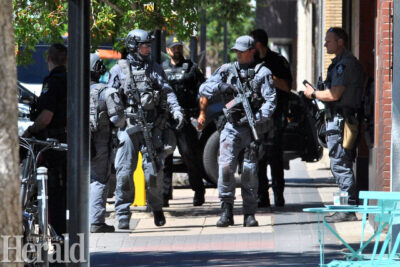Police using innovative tools to deal with trauma
By Alejandra Pulido-Guzman - Lethbridge Herald on April 8, 2025.
 Herald file photo by Ian Martens -
Lethbridge Police Service tactical team members walk from the scene after responding to a violent hostage situation downtown in 2022. The police service has implemented a program meant to reduce the risk of trauma-related injuries experienced by police officers.
Herald file photo by Ian Martens -
Lethbridge Police Service tactical team members walk from the scene after responding to a violent hostage situation downtown in 2022. The police service has implemented a program meant to reduce the risk of trauma-related injuries experienced by police officers.LETHBRIDGE HERALDapulido@lethbridgeherald.com
Lethbridge Police Service and Wounded Warriors Canada have joined forces to launch an innovative program to reduce the risk of trauma-related injuries experienced by police officers.
After seeing a presentation by an Israel group talking about what they do to help their soldiers, as they have been in a state of combat for many years, Deputy Chief Gerald Grobmeier realized LPS was missing something to deal with traumatic events and Post Traumatic Stress Disorder (PTSD) by waiting until the events that lead to it are over.
“There are opportunities where we can do better and take care of each other, physically and mentally during events, and we don’t have to wait until everything is over, safe and everyone has gone home,” says Grobmeier.
From there, last year, Grobmeier began working with Wounded Warriors Canada to build a resiliency training model that could be implemented as close to an incident as possible. And after extensive collaboration with Dr. Tim Black, WWC’s National Clinical Director, that concept became a reality.
LPS and WWC partnered to deliver Down Regulation Skills Training (DRS-T) – the first of its kind in North America.
The innovative program equips trauma-exposed professionals with simple, practical interventions they can use not only after a high-stress call, but during the event itself as long as it’s safe to do so.
“We’re looking at providing more education and tools to our members when it comes to dealing with being exposed to a traumatic event,” says Grobmeier.
LPS defines a traumatic event is the direct or indirect experience of being threaten with death, serious injury or violence.
“We recognize the importance of proactively supporting our officers by giving them the education and tools to help reduce the risk of trauma-related injuries,” says Grobmeier.
It’s estimated more than half of civilians will experience at least one potentially traumatic event in their lifetime. In contrast, police officers are exposed to approximately three to five traumatic events every six months. That means officers may experience up to 200 per cent more trauma than the average person.
At the heart of the Down Regulation Skills Training program is the BETR model – Body, Emotions, Thoughts and Relationships. It guides officers through a quick self check-in, helping to down-regulate the body’s stress response when the natural process gets disrupted – something that happens often in policing. These grounding techniques help officers stay present in the moment and reduce the risk of injury after a traumatic event.
“Very little work has been done in the moment, to help officers while they are dealing with a traumatic event or going from event to event and these techniques help officers stay present in the moment and reduce the risk of injury after a traumatic event,” says Grobmeier.
The BETR model techniques involves members verbalizing what they are feeling physically, emotionally and mentally, and it is ideally done with a buddy.
“That could be by saying ‘my hands are shaking, I am sweating profusely,'” says Grobmeier. “And about their emotions, are they sad, are they scared?”
Mentally, members could be talking about what they are thinking in the moment, and the relationship is how connected they are to their team.
“It’s a very quick check-in that helps start the process of down regulation, the natural body stress response,” says Grobmeier.
When LPS began to work with WWC on the initiative, they brought in Dr. Black for a few days to work with members of the tactical team.
“He spent the first day observing our tactical team run scenarios, to learn about what they are exposed to,” says Grobmeier.Â
The next day Black provided a three-hour in-class session explaining how the body naturally responds to traumatic events and what can be done on the spot.
“Then we went back outside and conducted a scenario with the tactical team and were able to stop it and start implementing these techniques to show them when and how they could be used,” says Grobmeier.
About a week later, the tactical team had a call they attended and on their own, they conducted self checks to know how they were doing.
“It was really neat to see how they took the simple tools and started to apply them right away,” says Grobmeier.
Moving forward, the DRS-T program will be integrated service-wide, so every officer has access to the mental health tools they need to do their job, protect the public and take care of themselves.
25-24



Wounded Warriors is a great organization I have supported for a few years and has helped military veterans and first responders for years.
If you are looking for an organization to support . . . this is one of your best choices!